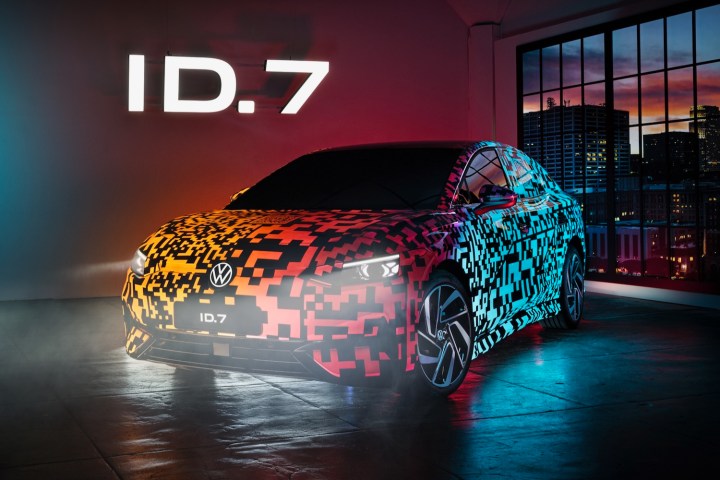The Volkswagen ID.7 is VW’s next electric car, and while it won’t be fully revealed until later in the year, the automaker provided a sneak peek at CES 2023.
VW said the production ID.7, which will be revealed in the second quarter of this year, will be influenced by the ID.Aero concept first shown in China in 2022. The camouflaged prototype VW brought to CES has the same general shape as the ID.Aero. It’s a streamlined sedan that VW claims will have up to 435 miles of range as measured on the somewhat lenient European WLTP testing cycle.

As with the Lucid Air, Mercedes-Benz EQS, and Tesla Model S sedans, a smooth shape helps maximize range by reducing aerodynamic drag. Air intakes in the front end direct the airflow around the sides of the car for maximum efficiency, and the sloping roofline was designed with drag reduction in mind.
The ID.7 is based on the same MEB platform as the VW ID.4 and ID.Buzz EVs. If you’re wondering why VW seemingly skipped from ID.4 to ID.7, it’s because there are also two other MEB-based EVs that aren’t sold in North America. The ID.5 is essentially a restyled version of the ID.4 aimed primarily at Europe, while the ID.6 is exclusive to the Chinese market. The ID.7 will be sold in Europe, North America, and China.
In addition to introducing the sedan body style to VW’s MEB family, the ID.7 will introduce an updated interface with a 15.0-inch touchscreen, augmented reality head-up display, and air vents controlled via the central touchscreen. The climate control system can also activate automatically when the car senses the driver approaching, pre-cooling the interior on hot summer days, and the car’s heated steering wheel is voice-activated.
The camouflage VW used for its CES show car is also noteworthy. It’s an electroluminescent design created with over 40 layers of paint, some of which conduct electricity. A total of 22 different areas can be controlled individually to create diffident light patterns, which can be synced with audio. That sounds like a neat idea, although VW runs the risk of this light show outshining the car underneath.
With the production ID.7 scheduled to be revealed later this year, expect it to go on sale in North America as a 2024 model. It could replace the gasoline VW Arteon, the automaker’s current large sedan, which is due for replacement within the same timeframe. The ID.7 is one of 10 new EVs VW plans to launch by 2026, but it’s unclear how many others are coming to North America.



